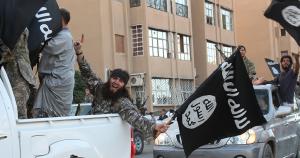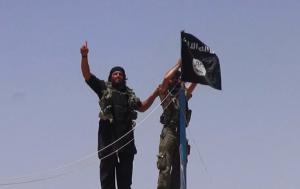View Gallery
Beirut (AFP) - In the Syrian stronghold of the Islamic State jihadist group, everything is black, activists say, from men's turbans to women's veils. Even the passports.
"Black IS flags are everywhere. Women are covered from head to toe in black burqas, and can only leave the house in the company of their fathers, brothers or husbands," said Abu Yusef, an activist from Raqa province, which IS considers its headquarters.
Asked what colour IS passports are, he laughed: "Black."
IS members parade on the streets with their weapons -- usually Kalashnikovs assault rifles or pistols -- while non-members are not allowed to own arms, he told AFP via the Internet.
They exert control over every aspect of life, with men and women controlled by separate security forces.
"The Khansaa brigade is composed of women IS members. They are armed, and have the power to stop and search any woman on the street," said Abu Yusef.
"Daesh's version of Islamic law is imposed by the men's Hesbeh brigade," he said, using the Arabic acronym for IS.
View gallery

A grab from an Islamic State video identified by private terrorism monitor SITE Intelligence Group o …
IS also has "ministries for everything you can imagine: education, health, water, electricity, religious affairs and defence. All the ministries occupy ex-government buildings."
Education is based on a strict interpretation of Islamic law, and military training camps for young boys have been set up in Raqa, Abu Yusef said.
"There is even a consumer protection authority," he said.
- Jihadist-only coffeeshops -
Activists in Raqa have frequently complained that the jihadists have access to recreation but forbid it for others.
They post photographs online showing jihadist-filled coffeeshops in Raqa, while complaining that non-fighters are not allowed to enjoy public spaces.
View gallery

An image made available by jihadist media outlet Welayat Raqa on June 30, 2014, is said to show an I …
In Deir Ezzor, where locals tried in vain to keep IS out, none of the coffeeshops that are so popular elsewhere in the Middle East remain open.
"Nothing good or fun is allowed," activist Rayan al-Furati told AFP via the Internet.
"It is impossible to even imagine anyone smoking, or anyone selling tobacco products. It is impossible to see a woman without a full veil. And every day, when the muezzins call for prayer, everybody closes their shops and goes to the mosque, or else they face detention."
For the group's jihadists, however, life in IS-controlled parts of Syria is good, not least because of the benefits they get.
The lowest IS cadres are paid $300 (235 euros) a month, said Raqa-based activist Furat al-Wafaa, using a pseudonym to protect his identity.
"In the current circumstances, that's a lot of money," he said via the Internet.
View gallery

An image uploaded on June 19, 2014 by Al-Hayat Media Centre shows Abu Muthanna al-Yemeni, believed t …
Wafaa said the group's generosity does not extend to those under its rule.
"Daesh is not really a state. It gives its members all the services they want, but other citizens get no part in that.
"It's a mafia that rules through terror. And people are forced by hunger to join, because that's the only way to get a proper salary."
At the same time, IS collects taxes from the population.
"Even those too poor to pay have to comply. So people are joining because they face the choice of starving, or joining in the extortion," he said.
Shopkeepers impoverished by a nearly four-year war pay some $60 a month in tax to the IS, he said.
View gallery

An image posted by jihadist Twitter account Al-Baraka news on June 11, 2014 is said to show Islamic …
- 'Settler occupation' -
Deir Ezzor's Furati, meanwhile, likened IS to a settler movement that has displaced the local population.
"Just as Israel occupied Palestine with settlers, the same thing has happened here," said the activist, who like tens of thousands of residents recently fled Deir Ezzor for fear of persecution.
"You have foreign jihadists, even Americans, living with their families where we once lived," said Furati, using a pseudonym to protect family members still in the province.
The jihadists have kept the oil and gas fields, electricity plants and dams in areas under their control running.
They pay employees an extra salary to continue working, adding to their uninterrupted monthly wages from the Syrian government.
Furati said employees belonging to President Bashar al-Assad's minority Alawite sect had long fled when IS arrived in Deir Ezzor and other employees have been kept on.
"Those employees still working the oil and gas fields were given guarantees they wouldn't be harmed, and Libyan engineers were brought in to support them," he said.
But power cuts and water shortages in IS-controlled areas are endemic, activists say, adding to the woes of those living under their rule.
Nael Mustafa, another activist still living in Raqa, said there is no separation between the public and the private in IS-controlled areas.
IS forces have no qualms about raiding homes and searching phones and computers for evidence of what they consider immoral practices.
"They believe that everything belongs to God -- and therefore comes under their control," he told AFP.